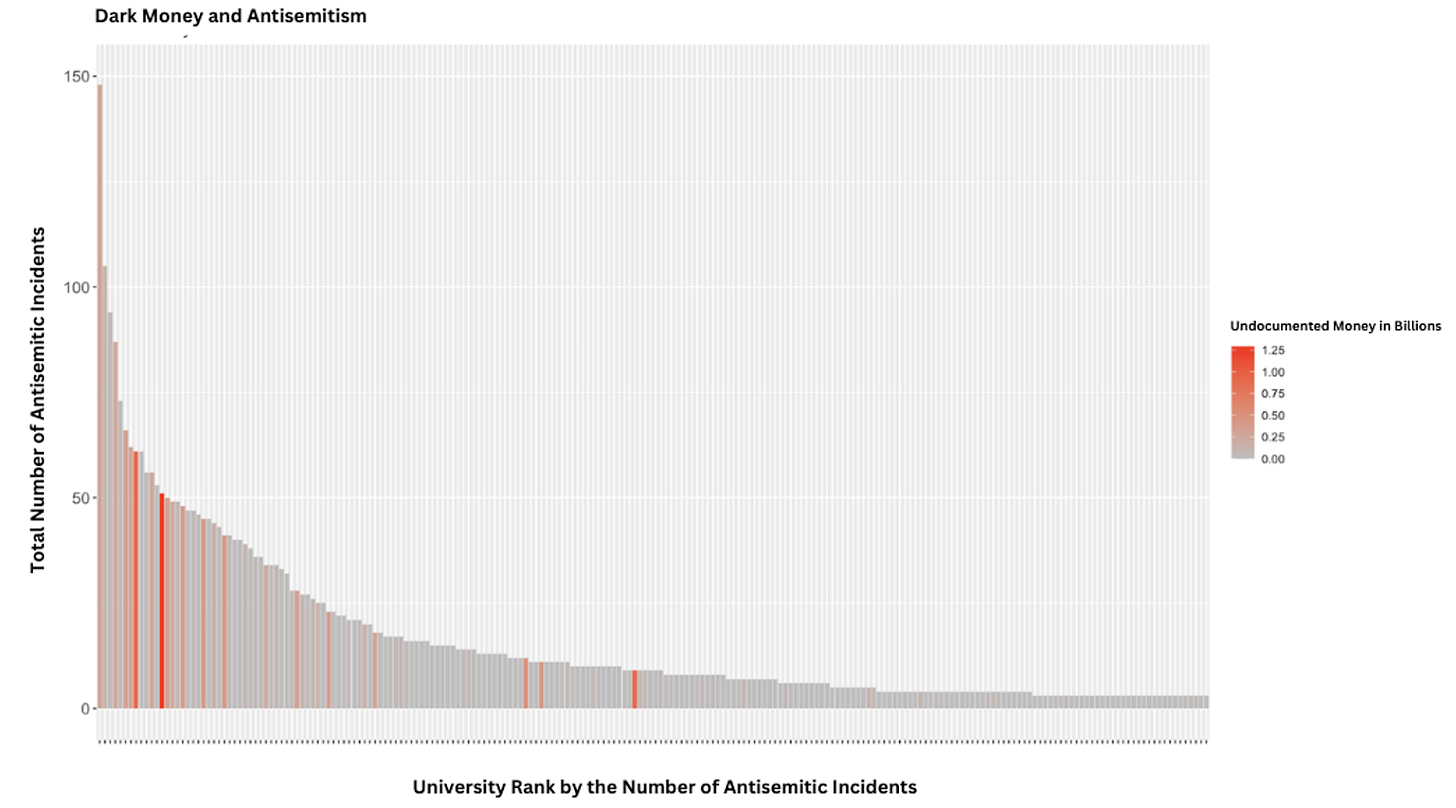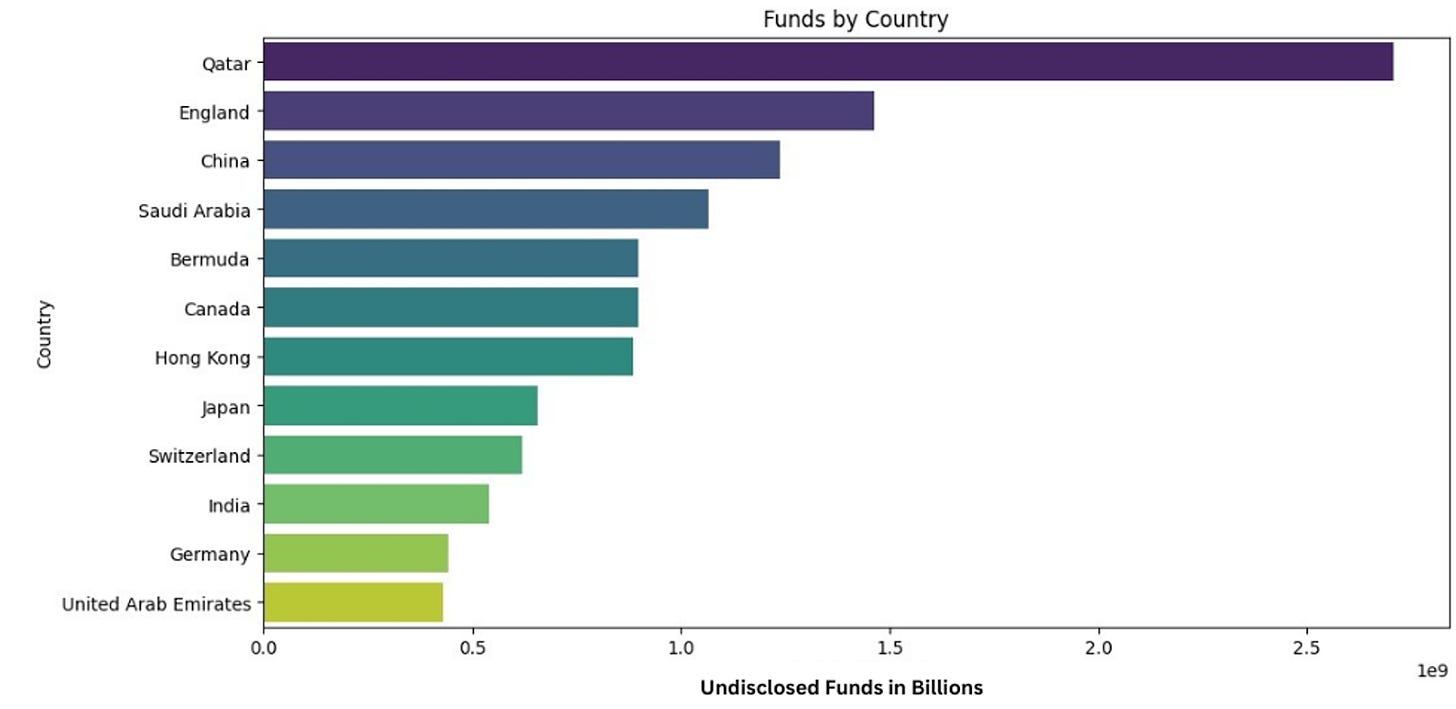You can bet your last dollar that this is NOT only happening in USA Universities and Colleges but rather going on around the globe in Canada, England, France, Spain, Germany, Greece Italy etc.
According to a new report, at least 200 American colleges and universities illegally withheld information on approximately $13 billion in undisclosed contributions from foreign regimes.
Since Hamas’s October 7 massacre, it has been hard to miss the explosion of antisemitic hate that has gripped college campuses across the country. At Cornell, a student posted a call “to follow [Jews] home and slit their throats,” and a professor said the terror attack “energized” and “exhilarated” him. At Harvard, a mob of students besieged an Israeli student, surrounding him as they bellowed “shame, shame, shame.”
At dozens of other campuses, students gathered to celebrate Hamas.
The response from school administrations has been alarming. With few exceptions, in the immediate aftermath of October 7, university presidents issued equivocal statements about the initial attack. Some professors even celebrated it. And the focus on the part of administration bureaucrats has been on protecting the students tearing down posters and being shamed for doing so.
Where did all of this hatred come from is a question worth pondering. As Rachel Fish and others have documented, for several decades a toxic worldview—morally relativist, anti-Israel, and anti-American—has been incubating in “area studies” departments and social theory programs at elite universities.
Whole narratives have been constructed to dehumanize Israelis and brand Israel as a “white, colonial project” to be “resisted.” The students you see in the videos circulating online have been marinating in this ideology, which can be defined best by what it’s against:
everything Western.
Many are rightly questioning how it got this bad. How did university leaders come to eulogize, rather than put a stop to, campus hate rallies and antisemitic intimidation? Why are campus leaders now papering over antisemitism? How could institutions supposedly committed to liberal values be such hotbeds of antisemitism and anti-Israel activism?
In large part, it is a story of the power of ideas—in this case, terrible ones—and how rapidly they can spread. But it is also a story of an influence campaign by actors far outside of the university campus aimed at pouring fuel on a fire already raging inside.
We’ve known for some time about the links between anti-Israel campus agitators, like Students for Justice in Palestine, and shady off-campus anti-Israel activist networks.
But thanks to the work of the Network Contagion Research Institute (NCRI), a nonprofit research center, we now have a clearer picture of the financial forces at play at a higher, institutional level.
Today, after months of research, the NCRI released a report (comprising four separate studies) following the money. The report finds that at least 200 American colleges and universities illegally withheld information on approximately $13 billion in undisclosed contributions from foreign regimes, many of which are authoritarian.
Moreover, while correlation is not causation, they found that the number of reported antisemitic incidents on a given campus has a meaningful relationship to whether that university has received funding (disclosed and undisclosed) from regimes, or entities tied to regimes, in the Middle East.
Overall, authors of the report write, “a massive influx of foreign, concealed donations to American institutions of higher learning, much of it from authoritarian regimes with notable support from Middle Eastern sources, reflects or supports heightened levels of intolerance towards Jews, open inquiry and free expression.”
The NCRI report found that:
From 2015–2020, institutions that accepted money from Middle Eastern donors had, on average, 300 percent more antisemitic incidents than those institutions that did not.
From 2015–2020, institutions that accepted undisclosed funds from authoritarian donors had, on average, 250 percent more antisemitic incidents than those institutions that did not.
At least 200 American colleges and universities illegally withheld information on approximately $13 billion in undocumented contributions from foreign regimes, many of which are authoritarian.
Campuses that accept undisclosed money are on average ~85 percent more likely to see campaigns “targeting academic scholars for sanction, including campaigns to investigate, censor, demote, suspend, or terminate.”
This chart from NCRI captures the relationship between concealed foreign donations and antisemitism on campus:
So who’s doing this concealed funding? Qatar, the country where Hamas’s leadership currently resides, is far and away the largest foreign donor to American universities, as Eli Lake recently documented in these pages:
Of course, correlation is not causation. Still, the NCRI report found that a reliable predictor of the intensity of campus antisemitism was the amount of undisclosed money a given university received from Middle Eastern regimes.
Former Harvard University president Larry Summers told me that he believes “donors and certainly authoritarian leaders who donate to universities may be looking to bolster their image or perception of legitimacy.” But he also said he doubts that “they are looking to or could succeed in changing attitudes or specific policies on campuses.”
“I’m cynical. I usually think things are about money. But I don’t think this is about money. Or at least not primarily,” a former president of a prominent liberal arts college told me. “If you look at the college professors signing on to these various statements, I don’t think it’s because those people got money in any significant way from a country like Qatar. It’s people who are ideologically part of a movement—whether you call it postcolonial or anticolonial—that is deeply opposed to Israel.”
There are other possibilities that may explain the NCRI’s findings. A fairly obvious one could be that Middle Eastern regimes are sponsoring professorships held by, or programs run by, professors or administrators who hold anti-Israel views and use their platform to spread them. This fact, itself, wouldn’t be news.
Another possibility is that universities, eager to attract and retain Middle Eastern funding, promote positions that they think will please the sensibilities of Middle Eastern regimes. Or maybe it is that universities that are indifferent to the atrocities committed or condoned by some of their largest funders are also indifferent to rising antisemitism on campus, allowing it to thrive. The same would hold true for freedom of expression and academic freedom.
At the very least, the NCRI’s findings may explain why university presidents, whose main job is fundraising, may have been so slow to respond in the wake of the October 7 massacre, and when they did, they for the most part released weak statements.
One thing I have a hard time believing is that these countries give nine- and ten-figure gifts to universities expecting nothing in return.
Sources:
https://www.thefp.com/p/campus-rage-middle-eastern-roots-qatar
https://networkcontagion.us/reports/11-6-23-the-corruption-of-the-american-mind/



.jpg)